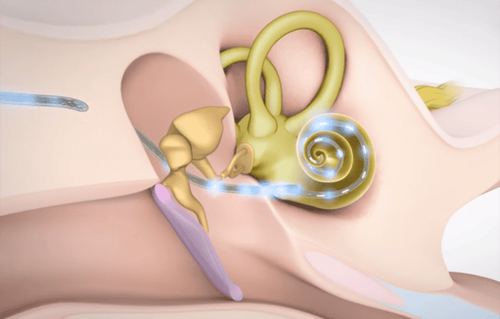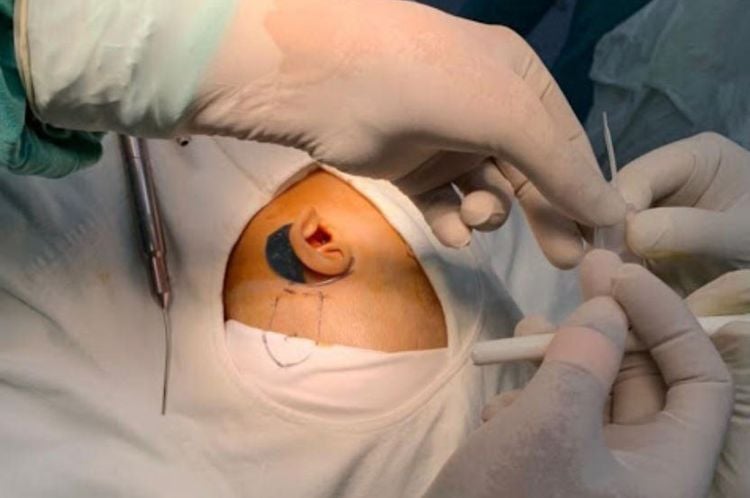This is an automatically translated article.
Older adults may be hard of hearing and difficult to understand conversation, they may feel frustrated because it feels like being abandoned. Some children are diagnosed with severe hearing loss in both ears and that can affect their ability to learn and understand speech. For these cases, a cochlear implant may be the best option.
1. What is a cochlear implant?
A cochlear implant is a device that partially restores hearing. It may be an option for people with severe hearing loss due to damage to the inner ear, who are no longer helped by hearing aids.
Hearing aids amplify sound, while cochlear implants bypass damaged parts of the ear to transmit sound signals directly to the auditory nerve. A cochlear implant is a sound processor placed behind the ear. The processor picks up audio signals and sends them to a receiver implanted under the skin behind the ear. The receiver sends signals to electrodes that are implanted in the cochlea-shaped inner ear (cochlea). The cochlea is the part of the inner ear that contains the nerve endings that carry sound to the brain.
The incoming signals from the receiver will stimulate the auditory nerve, then send them to the brain. The brain takes in and processes those signals into sounds, even though these sounds won't sound like they should.
It takes time to adapt to the signals received from the cochlear implant. Within a year of cochlear implantation, most patients achieve significant improvement in speech understanding.
2. What cases need cochlear implantation?
Cochlear implants can help restore hearing in people with severe hearing loss who use hearing aids to no avail. Cochlear implants can help improve these people's communication and quality of life.
Cochlear implants can be implanted in one ear or both ears. Cochlear implants have begun to be used more often to treat severe bilateral hearing loss, particularly for infants and young children who are learning speech and language processing.
Adults and children aged 6 to 12 months can benefit from a cochlear implant. Accordingly, people with cochlear implants reported improved:
Ability to hear and understand speech without visual cues such as lip reading. Recognize sounds in everyday environments. Ability to hear in noisy environments. The ability to find where the sound is coming from. Ability to understand TV shows, music and talk on the phone. Cochlear implants are indicated in the following cases:
Severe hearing loss that disrupts voice communication. Little benefit from hearing aids as determined by specialized hearing tests. There are no medical conditions or risk factors associated with cochlear implants. Highly motivated person to restore hearing. Expectations about what cochlear implants can help improve hearing.

Cấy ghép ốc tai điện tử được chỉ định với một số trường hợp nhất định
3. Possible complications of cochlear implantation
In general, cochlear implant surgery is safe. However, there are certain risks involved, including:
Remaining hearing loss: Implantation can cause residual hearing loss in some people. Meningitis (the membrane that surrounds the brain and spinal cord): After cochlear implant surgery patients can develop meningitis. Adults and children are usually vaccinated to reduce the risk of meningitis before transplant. Device failure: Sometimes re-surgery may be needed to repair or replace a faulty internal device. Very rare complications of cochlear implant surgery include:
Bleeding Face paralysis Infection at the site of surgery Device infection Balance problems Dizziness Taste disturbance Tinnitus Leakage spinal cord SEE ALSO: Cochlear implant surgery in hearing impaired
4. Cochlear implant surgery procedure
Cochlear implant surgery is performed under general anesthesia. This means you will be in a sleep-like state during the surgery. Accordingly, you may need to:
Stop taking certain medications or supplements for a certain period of time. Avoid eating or drinking for a certain amount of time before surgery. Your doctor will give you specific instructions to help you prepare.
4.1. Before the procedure You will need a detailed medical evaluation to determine if a cochlear implant is a good option. A doctor will conduct the necessary evaluation including:
Tests of hearing, voice and sometimes balance. Perform a physical exam to evaluate the health of your inner ear. Brain MRI or CT imaging to evaluate the condition of the cochlea and inner ear structures. Mental health (psychological) testing under certain circumstances to determine your ability to learn to use a cochlear implant. 4.2. During the procedure, your surgeon will make an incision behind your ear and make a small hole in the bone of your skull (mastoid bone) where the device will be inserted. The doctor then makes a small hole in the cochlea to insert the device's electrode inside. The skin incision is sutured so that the device inside is under your skin.
After surgery you may experience:
Pressure or discomfort in the implanted ear Dizziness or nausea. Most people feel well enough to go home the same day or the next day. The audiologist will not turn on (activate) the cochlear implant for about two to six weeks after surgery to give the surgical site time to heal.

Hình ảnh quá trình phẫu thuật cấy ghép ốc tai điện tử
4.3. Cochlear implantation For cochlear implantation, an audiologist will:
Adjust the sound processor to fit you. Check the components of the cochlear implant to make sure they are working properly. Identify the sound you hear. Provides you with information on proper care and use of the device. Position the device so that you can hear to the best of your ability. 4.4. Rehabilitation Rehabilitation involves training your brain to understand sounds heard through the cochlear implant. Daily speech and environmental noise will sound different from what you remember.
Your brain needs time to realize what these sounds mean. This process is continuous and is best achieved by wearing the voice processor continuously during waking hours.
4.5. Cochlear implant results Results of cochlear implant surgery vary from person to person. Factors that can affect the outcome of a cochlear implant include:
Age of hearing loss The length of time between hearing loss and cochlear implant surgery. For children, the best results are usually achieved with cochlear implantation at an early age. For adults, the best outcome is often related to a period of more severe hearing loss prior to cochlear implantation. Adults with little or no acoustic experience tend to benefit less from cochlear implantation.
Some of the results that can be achieved after a cochlear implant include:
Better hearing. Many people who meet the hearing criteria for cochlear implants can hear better with this device. Improve tinnitus. Although tinnitus is not the primary reason for a cochlear implant, a cochlear implant may partially prevent or improve the severity of tinnitus during use. It can rarely worsen your degree of tinnitus. The cochlea is the part of the inner ear that contains the nerve endings that carry sound to the brain. A cochlear implant is a small electronic device that, when surgically placed under the skin, stimulates nerve endings in the cochlea to provide sound sensation to people who are severely deaf or have severe hearing loss.
Severe hearing loss in both ears that prevents a person from understanding speech and communicating in everyday conversations. Cochlear implants can enhance hearing and communication for people who are not getting enough benefit from traditional hearing aids. Accordingly, before implementation, you should also learn about the cost of cochlear implants to ensure financial viability.
Please dial HOTLINE for more information or register for an appointment HERE. Download MyVinmec app to make appointments faster and to manage your bookings easily.
References: fda.gov, mayoclinic.org












